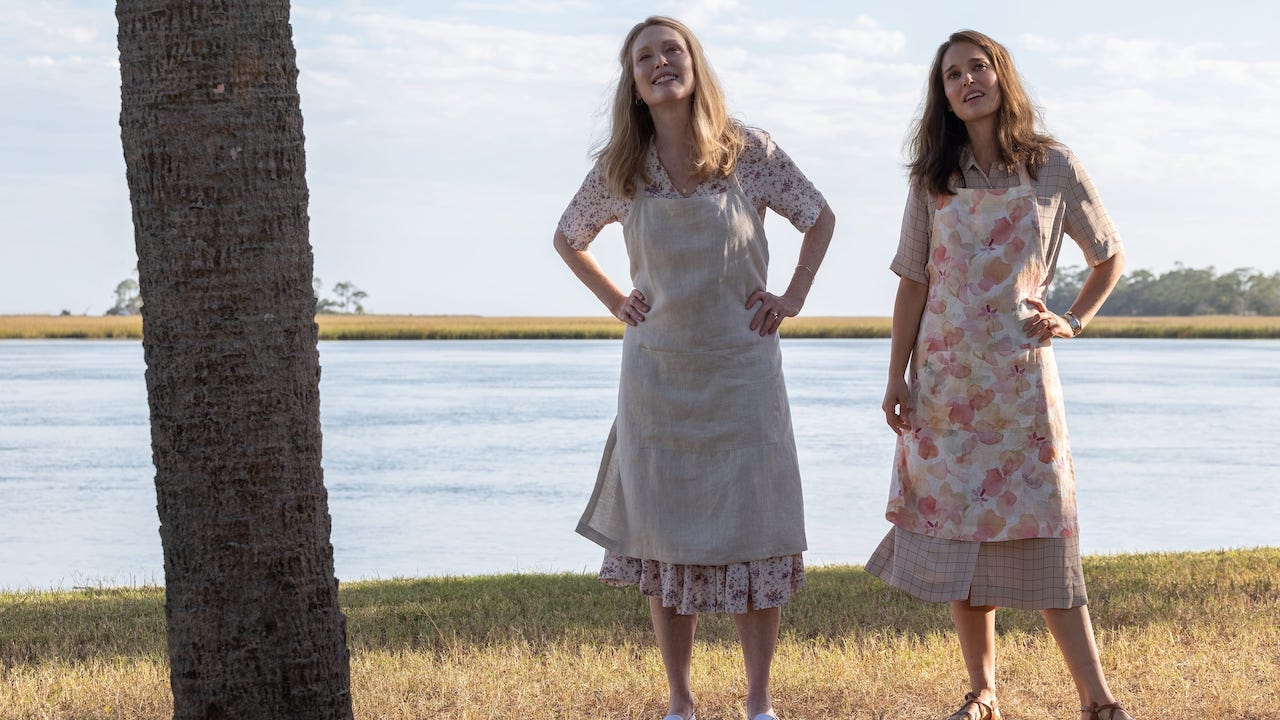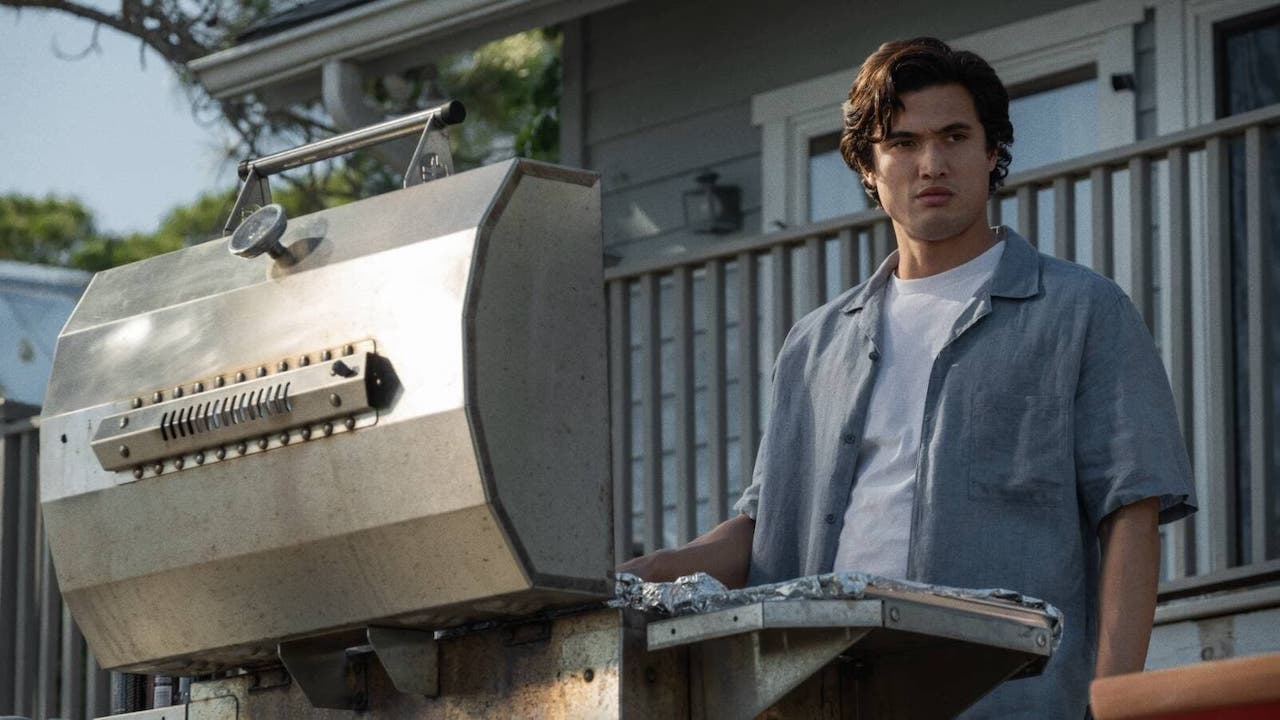Is May December camp, melodrama, or straight-up tragedy?

A predatory housewife and her far-younger husband invite an actress into their lives, as she studies them for an upcoming role. Sounds twisty enough already: but to Eliza Janssen, May December has been broadly misinterpreted. Not to mention getting robbed blind at the upcoming Oscars.
May December
Todd Haynes is, I think, a true romantic. He’s made biopics of his music heroes—Karen Carpenter, David Bowie, Bob Dylan—that reject fact in favour of luscious, unstable interpretation. He’s one of our only living directors that continues to work in the 1950s Hollywood mode of “women’s pictures”, remixing Sirkian melodrama and luxuriating in mid-century glamour with Carol.
Where’s the romance in his Palme d’Or nominee May December, then? The title and premise land us in dark waters already, promising drama based loosely on the true tabloid story of Mary Kay Letourneau—the school teacher who maintained a predatory relationship with her former sixth-grade student, after being released from prison and birthing his child.
Playing a brittle, blithe analogue of this real-life criminal, Julianne Moore brilliantly leans into our discomfort, right from May December’s opening scene. Sinister string music borrowed from a 1971 romantic thriller sets a lurid mood; footage of monarch butterflies, spawning and taking flight, brings to mind themes of age and growth.
Just when our hearts (and loins?) can’t take any more sentiment, Moore gazes into the fridge and coolly utters: “I don’t think we have enough hot dogs.” It’s the moment that clues viewers into Haynes’ unusual, often funny tone…but it’s also lead some irony-pilled audiences down the wrong path in understanding May December as a whole.
You know a screenplay is an all-timer when even reading it is incredible pic.twitter.com/Y6jtOBc3iu
— hannah strong (@thethirdhan) November 23, 2023
Little White Lies critic Hannah Strong highlighted that line in the screenplay above on Twitter, after her review called the movie “Haynes’ funniest film to date”. The appreciation isn’t superficial, and Strong’s thoughtful review is well worth a read—but it’s disappointing to me that one introductory moment has ended up broadly summarising the film overall to many audiences unwilling to dip below May December‘s stylish surface.
The silly line is such a stand-out that even director Haynes has had to grapple with its reception, admitting to being “a student of camp” while simultaneously rejecting the label. “I felt like it was possibly reductive”, the director told IndieWire, relating that he was shocked by some laughs at the film’s Sundance premiere. “But then I thought, you know what? The term is sort of symptomatic of trying to locate a word that means…to me, camp is in the eye of the beholder.”
Like Karlie Kloss at the 2019 Met Gala, my own eye for camp has taken a minute to develop. When I saw May December at MIFF 2023, I was a little put off by the giggling, too-cool-for-school cinema audience around me, who seemed to find every Natalie Portman line and icy Julianne Moore gaze hysterical. The Guardian called the film “amusing”; Time Out and Slant referred to it as “delicious”, like a naughty chocolate mudcake dessert rather than a story about a child being groomed. Had I missed a trick here, and accidentally taken a contemporary crack at the 1960s “hagsploitation” horror genre too seriously? Were we just meant to watch and laugh as these two tremendous female actors tear one another to shreds, Faye Dunaway’s warning against wire hangers ringing in our ears?
These reviews are valid readings, of course—more valid to my mind, at least, than Netflix’s attempted memeification of Charles Melton’s groomed character, which certainly leaves a sour taste. A second viewing of the movie from the discomfort of my own home revealed far greater depths; plunging sadness, nuance, moments that induce laughter only in their shocking, bruising audacity. Not any light, Tweet-worthy, mother-is-mothering camp.
Julianne Moore has long been Haynes’ muse, grounding the heightened domestic tension of his films Safe and Far From Heaven: she’s always a put-together woman whose idyllic life begins to crumble around her feet, and Haynes is always there to romanticise the debris. One has to wonder whether he sees himself in Elizabeth (Portman), the TV actress who’s been cast to play Gracie (Moore) in a film adaptation of the whole scandal. Elizabeth is a chilly poser, barely able to conceal that she sees her hosts as mere source material. Slowly, her adoring witness of Gracie and her 20-years-younger husband Joe (Melton) begins to have a corrosive effect.
Portman probes annoyingly at the disgraced couple, her most hard-hitting questions seemingly glancing off Gracie after decades of tabloid dissection. But later, in Gracie and Joe’s bedroom or in front of their surprisingly well-adjusted kids, the pair’s suppressed true feelings helplessly resurface. They’re undeniable in their bleakness to us viewers; no matter how good Moore is at ugly-crying, she’s never as funny as my MIFF audience performatively wanted her to be.
May December is brimming with big ideas about adaptation; interpretation; the impossibility of understanding another person, as much as Portman’s desperate wannabe might try. It’s never lost on us that this wicked tale of one woman striving to take inspiration from another is, itself, inspired by sordid real life events. Everything else in Haynes’ vision, from the film’s repurposed soundtrack to its Southern Gothic setting, reads as a tailored memory of some better, happier time (tourists traipse alongside Elizabeth and Gracie as they tour Savannah, learning about the town’s dark true crime history).

Despite the aesthetic cleverness and some surprisingly comedic, near-camp moments to send Film Twitter into a minor frenzy, there’s a core of genuine tragedy to May December—mostly manifested through Charles Melton’s breathtakingly tender performance. Still that preyed-upon schoolboy in many ways, Melton’s Joe is facing a make-or-break transition, uncertain where he now stands in the complex power dynamic between him and his loathed wife. The couple’s own kids are now graduating, emerging into adulthood like the butterflies Joe raises. The metamorphosis metaphor is extremely, almost humorously on the nose—but it gets its heartbreaking point across.
For all this promise of melodrama and wrongheaded, swooning seduction, May December will in fact disappoint viewers tuning into Netflix to watch a Portman/Moore catfight. It’s a far more subdued piece of paranoia, blossoming into bleak hotel bedroom reckonings and a grim coda of an ending. And it is, somehow, romantic—only in the twisted, Gothic meaning of the word, obsessing over each player’s unrealised inner darkness.
So there you have it: camp, nah. Melodrama? Sure. Tragedy? Absolutely. If you don’t see that in the text, you’ll surely feel it in the fact that the film’s taken so long to arrive in some region’s cinemas, only to rack up a single paltry Oscar nom (for Samy Burch’s brilliant script). The lack of a Best Supporting Actor nod for Melton is especially tragic—there aren’t enough hot dogs in the world to sate my furious hunger for more.

















